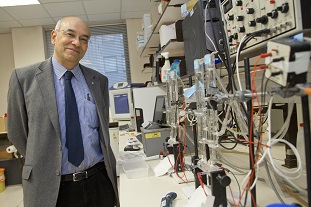New strategy to treat Cystic Fibrosis
Published On Tue 11 Nov 2014 by Grant Hill

An international research collaboration, including scientists from the University of Dundee, have described a new approach for the future treatment of most cases of Cystic Fibrosis (CF), offering unexpected hope to patients suffering from the debilitating and life-shortening inherited disease.
In a study published in the journal Autophagy, the consortium of scientists from Italy, France and Scotland showed how the combination of two drugs reversed the key features of Cystic Fibrosis (CF) in a pilot phase 2 clinical trial featuring ten patients with the most common form of the disease. The research in Dundee has been supported by the Wellcome Trust since 1991, and initially by the UK Cystic Fibrosis Trust.
The candidate therapy involves an already licensed drug, Cysteamine that is given with a second drug epigallocatechin gallate (EGCG). Researchers found that the two drugs given together reduced inflammation in nine out of ten of the patients’ airways and also dramatically reduced the levels of salt in their sweat – a characteristic feature of CF that places a baby into CF therapy for life.
The researchers are now hoping to set up a large-scale trial to prove the drug combination’s effectiveness across an international CF population, which could lead to a completely new approach to therapy for the commonest form of CF.
Dr Anil Mehta, a clinical reader at Dundee’s Medical Research Institute, has been working on CF for more than 20 years and described the findings as an extremely encouraging first step.
“The results suggest that it might be possible to arrest the disease. Obviously we are still at an early stage but if these results are replicated in a placebo controlled clinical trial, then I believe it could be a potential game-changer. However, we will need more support to make this happen.
“These drugs are already licensed, and being off-patent means the cost of developing a drug therapy should not be prohibitive.”
Cystic Fibrosis is the most common inherited disease in the UK, affecting over 10,000 people. About 1 in 25 of the population in the UK carry a mutation in a gene called CFTR, which makes it hard for the body to efficiently fight off infection by bacteria, particularly in the lungs in CF-affected children.
As a result of screening in Scotland since 2003, it is known that in Scotland 1 child in every 2345 is born with CF. Dr Mehta’s long-term ambition is to develop drugs to give to babies soon after diagnosis to prevent their lungs declining.
Previous work by the consortium of French and Italian scientists found that CF patients experience difficulty removing ‘detritus’ from their cells which builds up as the cells get older - a process called autophagy, literally self-eating. Healthy cells break down and self-digest this material but this doesn’t happen in CF sufferers, where an overactive enzyme called transglutaminase 2 (TG2) binds proteins together in the cell in a clump, causing inflammation, a hallmark of CF.
Dr Mehta’s colleagues at the Universities of Milan, Naples and Paris examining this cellular clumping activity in CF explored the possibility of using Cysteamine, used for decades to treat a rare children’s disease called Cystinosis, as a way of combating the effects of overactive TG2. They found that this single drug proved very effective in reversing the inflammatory aspects of CF.
Dr Mehta said, “The overactive enzyme TG2 acts like an out-of-control spot welder, binding together every protein it comes into contact with. My colleagues showed they had a medicine capable of bringing that welder under control.
Research carried out in Dundee over the past 15 years has shown than another overactive enzyme, a protein kinase called CK2, was present in CF patient cell biopsies. The consortium paired up with researchers at the University of Padua and next discovered that epigallocatechin gallate (EGCG), a green tea flavonoid already approved as an over-the-counter tonic, showed promise for preventing overactivity in CK2 in the test tube and this was given along with cysteamine to 10 patients who all had the same common type of CF. The combination of drugs reduced inflammation further and now reduced the levels of salt in the sweat in nine of the ten patients
Dr Mehta added, “I would like to thank all those who have volunteered in Dundee to donate their airway cells since 1991, they are the true, selfless folk who made this possible. The work shows the value of international cooperation in attempts to beat this very nasty disease.”
Notes to editors:
1. Cystic fibrosis is the most common inherited disease in the UK, affecting over 10,000 people. About 1 in 25 of the population in the UK carry a mutation in a gene called CFTR, which makes it hard for the body to efficiently fight off infection by bacteria, particularly in the lungs in CF-affected children. Every 60th UK person carries the type of mutation that could benefit from this breakthrough.
About the Wellcome Trust:
The Wellcome Trust is the world’s second-highest spending charitable foundation, dedicated to achieving extraordinary improvements in human and animal health. We support bright minds in biomedical research and the medical humanities, including public engagement, education and the application of research to improve health. We are independent of both political and commercial interests. www.wellcome.ac.uk.
For media enquiries contact:
Grant Hill
Press Officer
University of Dundee
Nethergate, Dundee, DD1 4HN
TEL: 01382 384768
E-MAIL: g.hill@dundee.ac.uk
MOBILE: 07854 953277